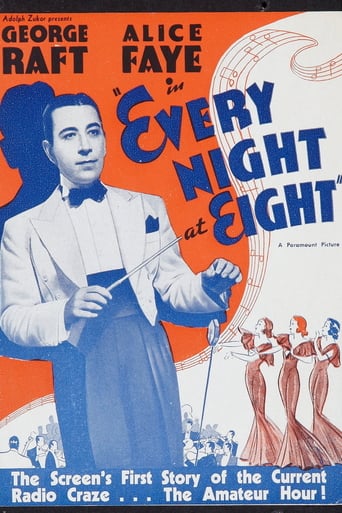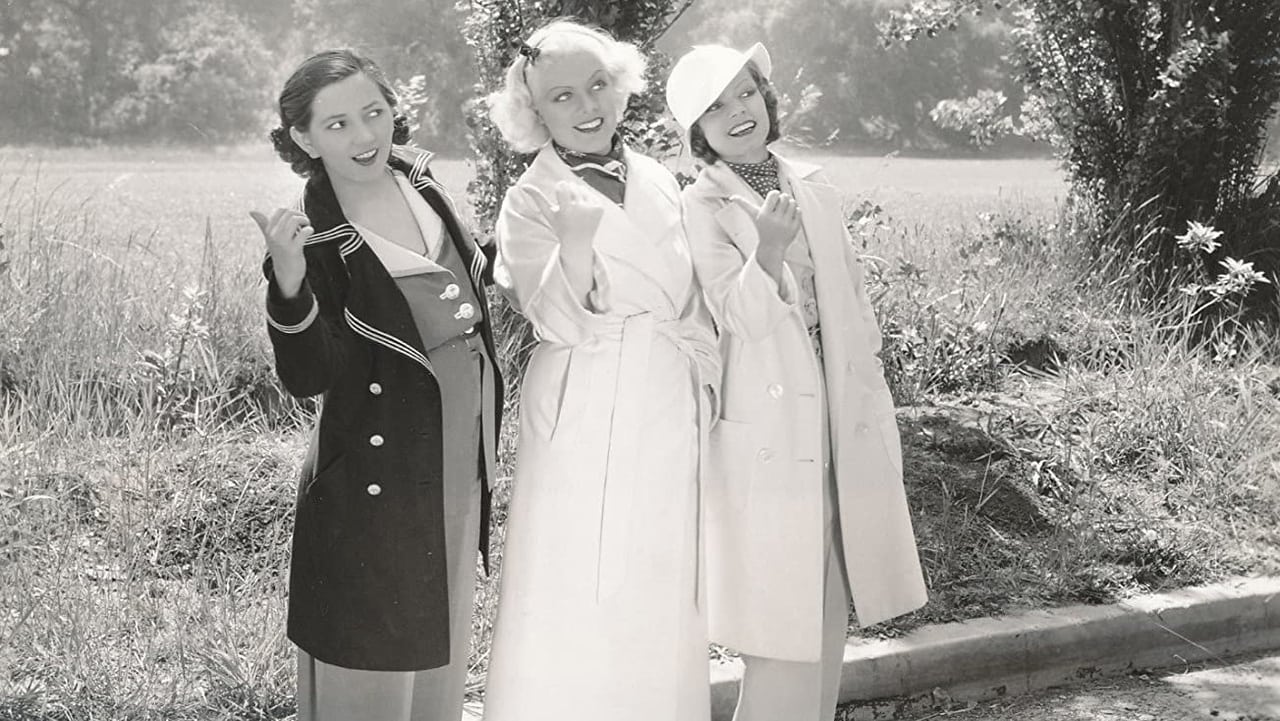calvinnme
...thus I'll give this one a six out of ten. If the plot had been more original it could merit an eight.Three girls (Alice Faye, Frances Langford, Patsy Kelly) work together in an office and get fired for using the boss' Dictaphone to make a record. They can't find any other jobs - this is still the Depression you know - and quickly run out of food and then out of rent money. Locked out of their own apartment, sitting on the rooming house steps, they see a sign advertising one hundred dollars for the winner of a radio contest. That will get them back into their room and buy food so off they go.The contest is hilarious, there is a very bad but dramatic trio, a bad singer in the operatic style, and even a woman singing while clucking like a chicken. Walter Catlett as the master of ceremonies is tailor made for the part. He's quite polite to all of the contestants right up to the time when he "gongs them" and cuts short their acts. Then in comes George Raft, as Tops Cordona with his orchestra consisting of pipe fitters, bricklayers, and carpenters. Tops is the conductor. They turn out to be quite good. Next, the girls are up, but Susan (Frances Langford) passes out from lack of food. They probably would have won, but with the act unfinished, the prize goes to Cordona and his band.Later the girls and Tops decide to team up - he names them "The Swanee Sisters" and has them fake southern accents. He promises that they will make lots of money and have lots of fun. He is half right. It turns out that Tops is a PR guy and salesman extraordinaire, as well as a good band leader. The problem is, he has the girls and the band going from show to show to the point that they have no time for fun. So, with an invitation to a swanky Park Avenue party, the girls run out on Tops, who has to do that night's show all alone. How does this all work out? Watch and find out. I'll just say that the girls find out that the upper crust is crustier than they imagined, and Tops finds out he is not tops without the girls doing vocals. The real conflict here is that Langford's character, Susan, is crazy for Tops, but all he seems to see in her is a singer for his band. That is the drama behind the film - there really is no other real conflict.With Alice Faye loaned out from Fox for her great musical presence and voice, and Patsy Kelly loaned from Hal Roach for her wisecracking abilities, this film has plenty of talent, plus it is rich in the atmosphere of old time radio. But if you see Raft as the headliner and expect some kind of crime drama or mystery, look elsewhere. What particularly surprised me was that the director of this film was Raoul Walsh, of whom Jack Warner once joked "Raoul's idea of a tender love scene is to burn down a whorehouse." Walsh adamantly believed the three greatest virtues of film were "action, action, and then action." So to look at those action films he made at WB from 1939 through 1949 and then look at this film, you would hardly recognize them as the product of the same director.Recommended for the music and the nostalgia of it all.
bkoganbing
Almost fifty years before Dream Girls made its Broadway debut, Paramount put out this film about a band-leader and a trio of singers whom he takes under his wing and then gets a little too bossy about their private lives. One wonders if someone at Paramount noticed the resemblance.Every Night At Eight is the title of the film and also the title of a radio show that the trio and the band-leader wind up with. The trio consists of Alice Faye, Frances Langford, and Patsy Kelly who are three girls with humdrum jobs, Faye and Kelly at a switchboard and Langford as a secretary. One day they wait for the boss to leave and decide to make a record on his Dictaphone machine. Unfortunately they're caught and fired.Luckily they get a break on an amateur hour radio show with Walter Catlett in a spoof of the famous Major Edward Bowes Amateur Hour. On the bill that night is band-leader George Raft and his orchestra of unemployed musicians from the New Deal Civil Works Administration. By the way, Catlett's performance is devastating.Raft won the Amateur Hour contest by default because Langford faints from lack of food. Still he recognizes a good thing when he sees it and signs the girls and gives them a name, The Swanee Sisters. Unfortunately just like in Dream Girls he interferes a little too much in their personal lives. Still it all works out in the end, but I won't tell which of them he winds up with.This is Alice Faye's first of two films that she did on loan out from Fox when she was with that studio. Alice gets a good song to sing entitled Speaking Confidentially, but in this film, she's overshadowed vocally by Frances Langford. Jimmy McHugh and Dorothy Fields wrote most of the score for this film including the aforementioned song that Faye sang, but also from this score is I Feel A Song Coming On which the trio does and later Frances Langford sings the song most identified with her, I'm In The Mood For Love. As you can see McHugh and Fields really out did themselves in the writing of the score of this film. Langford also sings another gem, this one written by Ted Fio Riot, Sam Lewis and Joseph Young entitled Then You've Never Been Blue. Were it not for the other two songs, this one would have been the hit of the film.George Raft does nicely in a role that for once doesn't call for him to slug somebody. But the camera betrayed the poor man in this. Watch during the sequence of I Feel A Song Coming On as Raft is conducting the orchestra. He must have been wearing boots with Cuban heels that were two to two and half inches to give him extra height. I'm surprised neither he nor director Raoul Walsh noticed in the rushes and had it edited out.Also in that number is an obbligato version by a black singer named James Miller who is in his one and only film. It's a good rendition and I do wonder what ever happened to him.The best thing that Every Night At Eight has going for it is one of the best musical scores from the Thirties. And the wonderful stars who perform these numbers.
ROCKY-19
Three adorable but out of work and homeless women try to win $100 in amateur contest on the radio, but when Susan (Frances Langford) passes out from lack of food, the prize goes to supremely confident and good-looking band leader Tops (George Raft). Once he really hears them sing, however, he brings them on board with his band. And by working them day and night brings them success with their own radio program. But his hyper-strict rules have Dixie (Alice Faye) and Daphne (Patsy Kelly) chafing for some freedom. Though Susan has quietly fallen for Tops, she goes along with the girls' scheme to buck his authority and possibly ruin his show.Sure it's not much of a plot, but this is a good-natured showcase for a host of talents and great wisecracks from Patsy Kelly. The girls are fun, Faye and particularly Langford get great solos. Langford makes "I'm in the Mood for Love" a standard. Raft, besides looking cool, gets to do a little dancing. Harry Barris has some rousing if brief little vocal ditties. And truly marvelous is uncredited singer James Miller, who takes over in the middle of the extended "I Feel a Song Coming On" number.If you're a fan of old-time radio you'll recognize all the corny exchanges and weird acts on the "gong show" radio program and maybe try to sing like a chicken yourself.
lugonian
EVERY NIGHT AT EIGHT (Paramount, 1935), directed by Raoul Walsh, stars George Raft as a brash young band-leader named "Tops" Cardona in one of many musicals of the 1930s set in a radio station. Alice Faye, on loan from Fox Studios, billed second in the cast after Raft, appears platinum blonde with pencil eyelashes in the image of Jean Harlow, but with a personality all her own. Third billing goes to the wisecracking Patsy Kelly, while Frances Langford, in her movie debut, actually the central character, assumes fourth billing and the film's most notable songs. The story involves three singers who, after losing their jobs as switchboard operators, make the best of the situation by going on an amateur radio contest, hosted by the master of ceremonies (Walter Catlett). Before their turn to show their stuff, there's Henrietta (Florence Gill), a hen-faced woman whose specialty is singing like a chicken!; the Radio Rogues playing the Radio Romeos spoofing Dick Powell's "Don't Say Goodnight" from WONDER BAR (Warners,1934), and Tops Cordona and his band. Although the girls lose the prize money to Tops, they team up with him, and billed as "The Three Swanee Sisters," the girls soon become radio's singing sensation appearing on the air every night at eight. As time passes, Langford as Susan has fallen in love with the "all work and no play" Cardona (who is at times so full of himself), but fails to realize this until after the girls take a temporary walk out, but they come back in the end after he realizes he isn't any good without the girls vocalizing him, and save him from becoming "Flops" Cardona With the music and lyrics by Jimmy McHugh and Dorothy Fields, the songs are as follows: "Take It Easy" (sung by Alice Faye, Patsy Kelly and Frances Langford); "Don't Say Goodnight" (by Al Dubin and Harry Warren, sung by The Radio Rogues); "I Feel a Song Coming On" (instrumental band playing by George Raft); "Take It Easy" and "Speaking Confidentially" (Faye, Langford and Kelly); "Then You've Never Neen Blue" (a ballad written by Joe Young and Sam Lewis, sung by Frances Langford); "Take It Easy" (reprise); "I Feel a Song Coming On" (sung by Faye, Kelly, Langford/ solo by Faye/ James Miller/ chorus); "Every Night at Eight" (Faye, Kelly and Langford); "I'm in the Mood for Love," "I'm in the Mood for Love" (both sung by Langford); and "Every Night at Eight" (Faye, Kelly and Langford). During the production number of "I Feel a Song Coming On" there's a brief moment where Raft does some fancy dance steps while conducting the orchestra, something that couldn't be appreciated from the radio listening audience. EVERY NIGHT AT EIGHT, an agreeable 80 minute film, is very nostalgic look at old-time radio with fine cast, lively tunes and witty dialog. "I Feel a Song Coming On" and "I'm in the Mood for Love" are the biggest song plugs here, the latter being most associated with Langford. Rarely televised since the early 1980s, this is one of the many musicals from that era one can hope to be revived again. (**1/2)


 AD
AD


